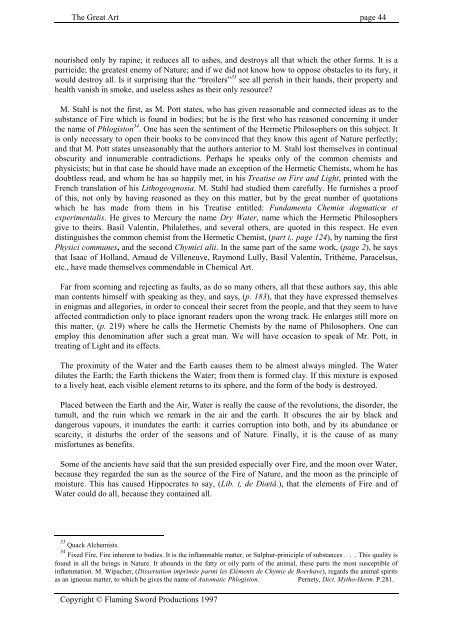The Great Art
Create successful ePaper yourself
Turn your PDF publications into a flip-book with our unique Google optimized e-Paper software.
<strong>The</strong> <strong>Great</strong> <strong>Art</strong> page 44<br />
nourished only by rapine; it reduces all to ashes, and destroys all that which the other forms. It is a<br />
parricide; the greatest enemy of Nature; and if we did not know how to oppose obstacles to its fury, it<br />
would destroy all. Is it surprising that the “broilers” 33 see all perish in their hands, their property and<br />
health vanish in smoke, and useless ashes as their only resource?<br />
M. Stahl is not the first, as M. Pott states, who has given reasonable and connected ideas as to the<br />
substance of Fire which is found in bodies; but he is the first who has reasoned concerning it under<br />
the name of Phlogiston 34 . One has seen the sentiment of the Hermetic Philosophers on this subject. It<br />
is only necessary to open their books to be convinced that they know this agent of Nature perfectly;<br />
and that M. Pott states unseasonably that the authors anterior to M. Stahl lost themselves in continual<br />
obscurity and innumerable contradictions. Perhaps he speaks only of the common chemists and<br />
physicists; but in that case he should have made an exception of the Hermetic Chemists, whom he has<br />
doubtless read, and whom he has so happily met, in his Treatise on Fire and Light, printed with the<br />
French translation of his Lithogeognosia. M. Stahl had studied them carefully. He furnishes a proof<br />
of this, not only by having reasoned as they on this matter, but by the great number of quotations<br />
which he has made from them in his Treatise entitled: Fundamenta Chemiœ dogmaticœ et<br />
experimentalis. He gives to Mercury the name Dry Water, name which the Hermetic Philosophers<br />
give to theirs. Basil Valentin, Philalethes, and several others, are quoted in this respect. He even<br />
distinguishes the common chemist from the Hermetic Chemist, (part I,. page 124), by naming the first<br />
Physici communes, and the second Chymici alii. In the same part of the same work, (page 2), he says<br />
that Isaac of Holland, Arnaud de Villeneuve, Raymond Lully, Basil Valentin, Trithéme, Paracelsus,<br />
etc., have made themselves commendable in Chemical <strong>Art</strong>.<br />
Far from scorning and rejecting as faults, as do so many others, all that these authors say, this able<br />
man contents himself with speaking as they, and says, (p. 183), that they have expressed themselves<br />
in enigmas and allegories, in order to conceal their secret from the people, and that they seem to have<br />
affected contradiction only to place ignorant readers upon the wrong track. He enlarges still more on<br />
this matter, (p. 219) where he calls the Hermetic Chemists by the name of Philosophers. One can<br />
employ this denomination after such a great man. We will have occasion to speak of Mr. Pott, in<br />
treating of Light and its effects.<br />
<strong>The</strong> proximity of the Water and the Earth causes them to be almost always mingled. <strong>The</strong> Water<br />
dilutes the Earth; the Earth thickens the Water; from them is formed clay. If this mixture is exposed<br />
to a lively heat, each visible element returns to its sphere, and the form of the body is destroyed.<br />
Placed between the Earth and the Air, Water is really the cause of the revolutions, the disorder, the<br />
tumult, and the ruin which we remark in the air and the earth. It obscures the air by black and<br />
dangerous vapours, it inundates the earth: it carries corruption into both, and by its abundance or<br />
scarcity, it disturbs the order of the seasons and of Nature. Finally, it is the cause of as many<br />
misfortunes as benefits.<br />
Some of the ancients have said that the sun presided especially over Fire, and the moon over Water,<br />
because they regarded the sun as the source of the Fire of Nature, and the moon as the principle of<br />
moisture. This has caused Hippocrates to say, (Lib. I, de Diœtâ.), that the elements of Fire and of<br />
Water could do all, because they contained all.<br />
33 Quack Alchemists.<br />
34 Fixed Fire, Fire inherent to bodies. It is the inflammable matter, or Sulphur-priniciple of substances . . . This quality is<br />
found in all the beings in Nature. It abounds in the fatty or oily parts of the animal, these parts the most susceptible of<br />
inflammation. M. Wipacher, (Dissertation imprimée parmi les Eléments de Chymie de Boerhave), regards the animal spirits<br />
as an igneous matter, to which he gives the name of Automatic Phlogiston.<br />
Pernety, Dict. Mytho-Herm. P.281.<br />
Copyright © Flaming Sword Productions 1997

















